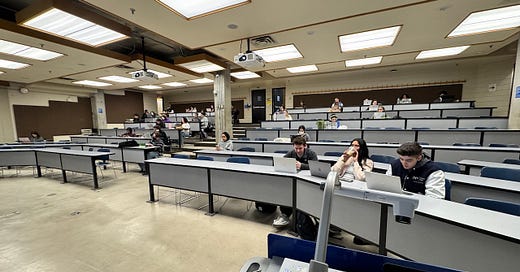Why I am thinking about giving up teaching
If nobody shows up and nobody cares, why bother?
I sent an announcement out to my Sustainable Design students last Wednesday morning:
“I will be doing my last big lecture of the year today. The lecture today is a roundup of the year and useful for the exam so if you can make to the class it should be an interesting and informative one.”
This is what I do: I plead with my students to show up. They are adults, in 3rd or 4th year at a University in Toronto, Canada, and I can’t make them come, even if the lecture is a compilation of everything I have learned in my career and want to share with them.
Only 40 out of my 135 students showed up. I realize that this is an optional course and that they are all working on their studio projects that have higher priority. But they are the same students who complain that if I don’t give them an A on an assignment, then they can’t get honours.
I was frustrated and angry, and at the end of the lecture, I thanked everyone who came but complained I was tired of doing all this work and presenting it to an empty room. Of having most of the ones that do show up looking at their computers instead of at me. Of getting endless emails asking “where do I get the instructions for the assignment?” when they are spelled out in the announcements; they can’t even be bothered to look. Of being unable to know whether a student or ChatGPT wrote an answer. I said this was probably my last term teaching; it is not fun or satisfying anymore.
I got home and opened my computer to see a Substack post titled The average college student today by a person named Hilarius Bookbinder. He (I am assuming “he” because of the male ending of Hilarius) writes:
“Most of our students are functionally illiterate…. Students get exam questions wrong simply because they didn't even take the time to read the question properly. Reading anything more than a menu is a chore and to be avoided.”
“Their writing skills are at the 8th-grade level. Spelling is atrocious, grammar is random, and the correct use of apostrophes is cause for celebration. Worse is the resistance to original thought.”
He then lists many of the problems I did: chronic absenteeism. Disappearing students. They can’t sit still for 50 minutes. They want me to do their work for them. Pretending to type notes in their laptops. Indifference. He concludes:
“All this might sound like an angry rant. I’m not sure. I’m not angry, though, not at all. I’m just sad. One thing all faculty have to learn is that the students are not us. We can’t expect them all to burn with the sacred fire we have for our disciplines, to see philosophy, psychology, math, physics, sociology or economics as the divine light of reason in a world of shadow. Our job is to kindle that flame, and we’re trying to get that spark to catch, but it is getting harder and harder and we don’t know what to do.”
I restacked the post and was shocked to receive more comments than I ever have on Substack, many of them long, thoughtful, and from other frustrated educators, including one from Mike Grimshaw in New Zealand, who wrote last year Can’t read, can’t write, can’t comprehend – & won’t think…?
“An increasing issue is the ever-decreasing frame of reference due to their withdrawal from any societal discussion, information or analysis that is not consumed via their social media feeds… We cannot assume there is any common culture of knowledge, any common culture of information, in any class. But worrying, most don’t seem to care that they do not know what it is assumed they should or would know. They are blissfully happy in their ignorance.”
To be fair, there are two sides to this story. One student complained in my comment stream about Hilarius’s post, in particular about sharing slides, which I do every week;
We are still reeling, in many ways, from the effects of COVID. Students’ immune systems are wrecked, and having lecture notes and recordings is very useful during record high flu seasons and a resurgence of measles cases, among other issues. I honestly don’t fully respect any professor who isn’t willing to provide basic accommodations like lecture slides to students, because professors can’t assume what challenges that student faces. The fact that they’re asking for the tools to help them succeed is better than if they were completely indifferent. I agree with some of your points, but overall this post seems pretty tone-deaf to me. People in higher education need to understand how much the world has changed, particularly since 2020, and adapt instead of holding students to expectations that no longer apply.

It also isn’t true for every student. Many of mine have done brilliant work this year on their assignments. I still have some coming up years later to tell me how my course changed their life or their choice of careers. The one thing that is keeping me going right now is the response to my tirade in class from a few students; here are some excerpts:
“Even though only a fraction of enrolled students attend regularly, those of us who do come are there because we truly want to learn from you. Your lectures are engaging, thought-provoking, and incredibly valuable. Although I am just one student, I know I’m not alone in this sentiment. My friends, who are also taking your course, and I all agree that your course is essential—especially in a time where overconsumption and excess are so prevalent. I truly hope you continue to share your knowledge with students in the future, as your teaching has had a lasting impact. Thank you again for such an insightful and meaningful class.”

And:
“In this uncertain, frustrating and, quite honestly, terrifying political climate that we are currently in, attending your lectures reminded me that there is still hope and that a sustainable world is not entirely out of reach. Your passion and advocacy make the course that much more relevant and vital. I can sincerely say that it would be a shame to lose you as a professor and a significant loss to the University curriculum. I am lucky that I have gotten the chance to learn from you firsthand, and I only hope that you continue teaching students beyond me and my peers.”
That might get me through grading another 50 presentations and 140 exams. We will see about next year.





Lloyd, I read your post with sadness. I too teach in that same environment. I too am disparaged as to my classes and the apparent lack of commitment to the standards you and I would have embraced those many years ago. It is harder and harder to get up the energy, year after year, to face the often impenetrable wall of student malaise. There are, as you point out, many committed, excited, inquisitive young minds each year. But fewer and fewer. Or at least fewer and fewer immediately apparent. It is exhausting, frustrating and infuriating. So I too may hang up the teaching spurs this year. Which I will hate to do. I love teaching. But as one of your students said, perhaps I just don't understand the new post- Covid, post reading, post writing, post drawing, post in-person attendance, post respect, post enthusiasm ..... student (and often faculty). If this is the case, perhaps they can be better served by someone of a generation that "gets it", in a way I never will .... and never wish to.
I retired last year after teaching high school math in large public schools in Colorado. I also have a 19-year old daughter and a 21-year old son, both of whom are attending university and now law school for my son in New Zealand (they’re dual citizens). My colleagues and I have definitely noticed an increased apathy and an increased negative parent involvement in our area. We are in a small conservative town (Rep. Lauren Boebert’s district and avid Trump supporters) but at a school that was intended to be more innovative with its structure and curricula. Probably needless to say, but the school has been pressured by loud parents and some district staff to conform to more traditional models and has lost much of what made the school unique, so I feel that has played some role in our student apathy. If they hear mom complaining about the “weird math” program at home, the kids are probably less apt to be engaged. We’ve also had an uptick in absenteeism, more for mental health than physical probably.
As a mother of the same age group, I struggle in this issue because I was seeing both sides. My son graduated high school in 2021 and struggle immensely during Covid shut downs. He talked to me frequently during his first year of Uni about his fear for the future for his generation - financial, environmental and political and didn’t feel like it was worth bothering to get a degree. His fear at times was almost paralyzing. And I was hearing that from other parents and educators. I convinced him and my daughter, both of whom are intelligent and thoughtful kids who had done well academically, to try university for a year, not because I wasn’t open to them pursuing a non-degree career but because they wanted to live overseas where they didn’t know anyone their own age yet. So I used the first year dorm as an incentive to get an education. While I know my son isn’t necessarily representative of his entire generation, he ended up loving Uni and finished his bachelors and is now in law school. But even he will admit that his fellow law students (some who are only 18 because NZ law programs can start as a bachelors track) seem apathetic and ask what he considers to be stupid questions regarding assignment instructions, etc
So I guess I feel your pain and can see that at least some of our students are truly struggling with health and fear because their world is, in some ways, very different from ours. Yes, their attention spans are trash but then I can’t tell you how many times I was in a staff meeting with other teachers or spending time with my Boomer parents and everyone around me was in their phones instead of listening to others. Now that I’m self-employed and work different hours, I also see Facebook posts and other garbage going up in the middle of the work day for people I know are supposed to be working for someone else. So the apathy isn’t restricted to Gen Z.
I just recently found your Substack through Laura Fenton and I really appreciate your thoughts on our future with climate change. So thanks for keeping up the good fight! As someone who already left the teaching profession (to pursue helping people declutter and live more sustainably), I certainly can’t counsel anyone to stay in teaching. But it sounds like you are making a difference to many and probably even to many of those who aren’t attending.